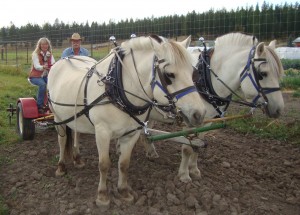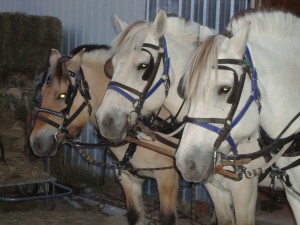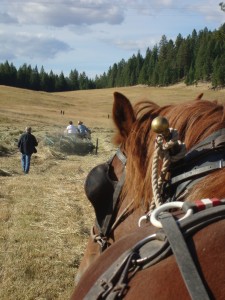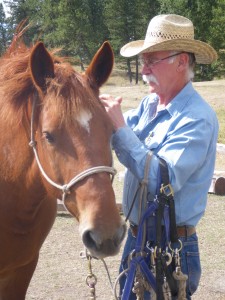…or how to drastically challenge the limits of my comfort zone.

- Cathy Greatorex and Dr. Doug Hammill drive a Forecart with a Cultivator
Two weeks ago, I attended Doc’s workshop to learn more about driving and working with my horses at home. It was an eye-opening experience and, after so much time spent in the technical world, a great way to reconnect with a more natural system of thinking. In so many ways, I had to rearrange my methods for solving a problem. I had to think much more like a horse.
Horses predominently think about two things: protecting themselves and getting along with their group (that is, when they aren’t thinking about food). By keying into that mindset, we can start to eliminate the confusion of communicating with another species. (At least, that’s how the theory works in my head.) Theory and practice are, in the real world, quite different. Doc’s workshop takes you from theory to practice, in a very safe learning environment. (I didn’t get a single bruise or scrape the whole time I was there, unlike working here on the farm.)

- Three Fjords!
After adequate preparation, I was handed the reins on the very first day. I drove Ann, the Suffolk Punch, down the road, up the hill, and back. Then I remembered to breathe. (I should do that once in awhile…) As I got used to handling the reins over the next week, the actual breathing part got easier.
Doc and Cathy teach four workshops a year at their ranch in Eureka, Montana. Each workshop has no more than five students. This means that we had a big enough group to learn from each other, yet each of our personal questions were addressed. In the six days I spent there, we learned how to:
-

- Side Rake in the hay field.
bring the horses in from the pasture,
- groom the horses and care for hooves,
- put on the harness, including fitting and adjusting it
- hitch to carts and wagons
- ground drive
- skid logs (little ones, mind you)
- rake hay
- use a walking plow with a single horse
- cultivate with a team
That’s a great deal of information for one week. My head is still swimming, I tell you.
Since I’ve been back, I’ve been able to change a few things to make working with the horses a bit easier. They are now coming in from the fields a bit more readily and I’m understanding their actions and motivations better. My blind quarter horse will take more work, but I now have, I believe, better ways to deal with his confusion. Because he can’t see, he’s very sensitive to both sound and touch which makes training him a delicate operation. I’m working on having him stand quietly and we’re very slowly making some progress.

- Doc and Ann
I’ve gained new confidence to work with my horses (and not screw them up). I can drive a team now. (I know! It’s shocking!) I just need to learn to breathe while doing so.
Other students from Doc’s workshops have gone onto full-time farming with horses and even driving competitions. If you’ve ever considered animal-powered work, this is definitely a great way to start learning. You can find out more information at his site, http://www.dochammil.com/. Many times, during the winter, he will travel throughout the West teaching classes. Catch one near you!




